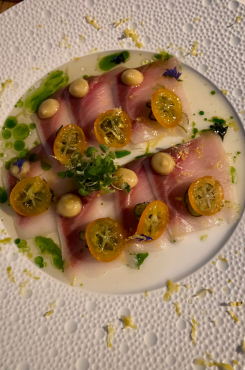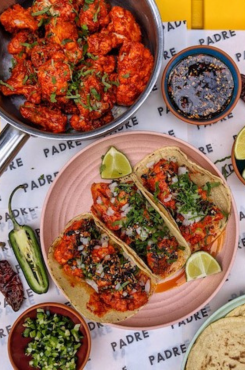The pandemic forced plenty of chefs and restaurateurs to rethink their businesses, creating some innovative and unexpected ways to connect with their customers. With no clear end in sight to the disruption caused by Covid-19, Ed Pettifer finds out more about hospitality 2.0
Each day we better understand the impact the nationwide lockdown had on our industry, with announcements of closures and disruptions now commonplace. When venues around the country were ordered to close at the end of March, no one could have anticipated the period of uncertainty and anxiety that followed – we were all blindsided and left in a kind of purgatory. As the furlough scheme was introduced, government grants and loans were dished out and the majority settled in for the long haul, a glut of creative, practical and bright people were left twiddling their thumbs not knowing when restaurants would reopen.
Despite the setbacks that came with the pandemic, many individuals, teams and businesses rallied in true industry spirit and devised solutions to the problems before them. Be it the creation of delivery platforms that rivalled the hefty commissions charged by the likes of Deliveroo, businesses pivoting to deliver their products or services to a new audience trapped at home or the invention of digital products that enabled customers to re-create the hospitality experience without leaving the house, lockdown demonstrated the entrepreneurial potential of our industry.
Food delivery platforms have grown exponentially in recent years with big players Deliveroo, Just Eat and Uber Eats dominating the market and charging restaurants up to 30% commission on each delivery. This approach to home delivery works for the likes of McDonalds and KFC, who operate on huge scale and can absorb these costs or pass them on to the customer without an eyewatering price hike. However for independents, the commission rates are punitive and do the very opposite of supporting their business. In addition, hot food delivery often under-delivers on quality and never lives up to the standards we all expect from the restaurant.
Meal kits, the solution turned to by many restauranteurs when their premises closed, enable customers to recreate the restaurant experience at home to a high standard and with very little effort. Food logistics expert and Dishpatch founder, Pete Butler, says that “meal kits enable restaurants to deliver their food and experience to a nationwide audience rather than just the guests they welcome in their establishments.” He adds that the meal kit experience is “far superior to the hot food takeaways as the food delivered [by Dishpatch] is very close to what you get in the restaurant”. Butler launched Dishpatch in reaction to the pandemic and aimed to bring some of the UK’s most exciting restaurants and chefs to homes around the country, a target which has since been met with numerous successful ‘feasting menu’ collaborations with St. John Bread and Wine head chef, Farokh Talati, and Kostas Papathanasiou, head chef at Jason Atherton’s 5 Social.
There were existing platforms that acted as alternatives to Deliveroo and its counterparts before lockdown was announced. Slerp, an e-commerce solution for businesses that puts owners and operators in control of their online sales “became a go-to delivery solution for London restaurants”, says founder JP Then. “[Lockdown] really put a rocket under us… restaurants recognised that online sales would become a crucial channel for their businesses and the relevancy and need for digital products was accelerated by the pandemic.” Slerp’s list of partner restaurants grew as a result of imposed lockdown measures with such names as José Pizarro and Ottolenghi turning to the platform to deliver products and meal kits around the country.
Restaurateur Charlie Mellor, who runs Laughing Heart, created Big Night during lockdown “as a response to the entire lack of quality delivery services”, which he dubs “too expensive, lacking in functionality, poorly curated, poor service or all of the above.” Mellor explains that Big Night was “founded within the independent restaurant community… [so] you’re in the mix with operators you respect, so we learn from each other and see the platform improve as we make changes based on their insights and feedback.” Big Night now works with well-respected partners such as Luca and Sager + Wilde, offering their famous dishes for home delivery via the platform.
Despite the technological revolution happening on one side of the city, other operators looked to a more old-fashioned approach to delivering their experiences to customers. Carousel, the renowned restaurant that sees an ever-changing line-up of international chefs through its doors, started delivering their ‘Greatest Hits’ meal kits by bicycle within a two-mile radius from their Marylebone home back in June. Now demand has “superseded the bike” says co-founder Ed Templeton. “We have partnered with a courier service to deliver further afield.”
In addition to delivery platforms, other digital products were created as a result of the lockdown that enabled customers to enjoy a degree of the restaurant experience from home. The Pass, dubbed the Spotify for recipes, allowed anyone to discover hundreds of recipes from top restaurants and recreate the dishes at home. As the nation was forced to do a lot more cooking than we may have previously (remember the banana bread craze?), The Pass was well received by all who missed the familiarity of restaurant cooking. Some restaurants, like Padella, did Instagram Live cookalongs to reconnect with their customers and instruct them through some of the classic dishes from the restaurant – so diners missing the famous cacio e pepe could recreate the dish at home.
Of course, it wasn’t just restaurants that were affected by the lockdown measures; their suppliers also felt the strain as practically all of their customers were forced to close. To combat the dip in profit, high-end fruit and vegetable supplier Natoora shifted its business to deliver to consumers’ homes. CEO Franco Fubini, says that “one of the great outcomes [of pivoting the business] was to reach customers we previously wouldn’t have had access to.” He explains that Natoora’s mission is to “replace a broken, opaque food system with a transparent and sustainable supply chain”, and the switch to home delivery enabled Natoora to get this message to households in the UK and the US, far beyond their existing network.
The sudden increase in home deliveries also benefitted food-packaging businesses. Eco food insulation pioneers, Wool Cool, saw, says MD Josie Morris, “a rise in demand as a consequence of lockdown, as people turned to buying food online and home delivery. Lockdown accelerated changes that some producers already had in the pipeline – we had been talking to a number of customers about devising the right temperature-controlled packaging for them, and lockdown simply brought that process forward.” FYI, if you’ve had a meal kit delivered wrapped in their cosy, natural soft material, it makes great winter insulation for beehives or just impromptu lagging for household drafts…
As well as changing the way restaurant, food and drink businesses think, the pandemic has changed consumers too – the way we receive, prepare and think about what we eat and drink. Many people may never return to the office environment and it has left a collective cloud of anxiety for some who are cautious about going out. We hope that doesn’t lead to any more grief for our beleaguered industry – but it might create yet more opportunities for innovative at-home hospitality experiences.
To read more articles from the latest edition of the CODE Quarterly magazine, click here



